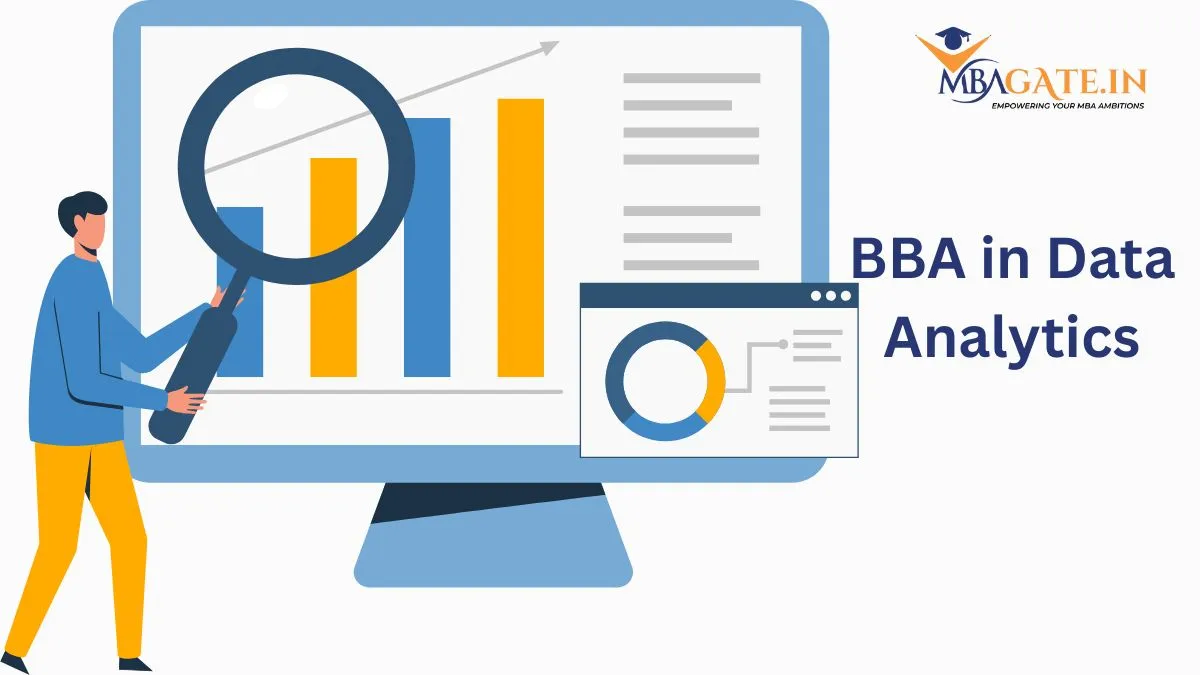BBA in Finance
A BBA in Finance is crucial in the modern education sector since finance forms the nucleus of all organisations, whether public or commercial. In the fast-paced and globalised market of today, companies are in constant search of experts who would be able to handle their money optimally, reduce costs, increase revenues and ensure long-term financial solidity. A BBA in Finance equips students to shoulder these responsibilities with robust analytical and decision-making skills.
This education is especially crucial today, with the increased need for economic awareness and financial know-how. With the deepening complexity of the markets, changing government regulations and advancements in financial technology (FinTech), there is a need for trained practitioners to adjust and make appropriate financial decisions. The BBA in Finance educates students in stock markets, investment planning, insurance and basic auditing and taxation. These skills are beneficial not just in the labour force, but also for anyone who wishes to manage their own personal finances well.
The program also exposes students to actual financial software like spreadsheets, accounting packages and analysis software, making them employable upon graduation. In addition, most institutions offer internships, seminars and projects that enable students to get real-life practice in the banking industry. This exposure familiarises them with the world of finance and makes it more likely for them to secure a good employment opportunity after graduation.
A BBA in Finance can open up many career opportunities. Graduates can find jobs in banks, investment companies, insurance firms, financial planning organisations, multinationals or government ministries.

Highlights of BBA in Finance
For a BBA in finance, it includes details about eligibility, the admissions procedure, typical costs and the package. The following list also includes the most popular job positions. For appropriate direction, students who wish to participate in the program might consult the information.
| Particulars | Details |
| Course Name | BBA in Finance |
| Eligibility | Class 12 passed |
| Entrance Exam | CUET UG, AIMA UGAT, SET |
| Admission Process | Merit-based/Entrance exams and personal interviews |
| The top college's average fees | ₹ 0.74 lakhs to ₹ 13.40 lakhs |
| The top college average salary | ₹ 4.65 lakhs per annum to ₹ 8.22 Lakhs per annum |
What is a BBA in Finance?
It's an undergraduate course of three years that educates students on how to manage money in a company. The subject matter of this course includes financial topics such as accounting, budgeting, investing, banking and financial planning. Students are educated on how companies make, spend and save money and how to make healthy financial choices.
The main objective of the BBA in Finance course is to give students a good grounding in business and finance. It covers subjects like financial management, company law, economics, the stock market, taxation and risk management. Students are also taught how to analyse financial information, produce reports and prepare budgets.
This course is suitable for mathematically gifted students who are keen on business and economics. It educates students about how money behaves in the real world and how companies succeed financially. A BBA in Finance also develops critical thinking, problem-solving and decision-making skills.
The students who study this course can find jobs in banks, financial institutions, companies and the investment world. Students can also opt for further education, like an MBA or professional courses like CA and CFA. In total, a BBA in Finance offers many job prospects and a good grounding in commercial finance.
BBA in Finance Subjects
Three years of undergraduate study are required for a BBA in finance. There are six semesters in the finance BBA program. A BBA in finance covers a wide range of topics, including banking and insurance, financial markets and institutions, marketing management and financial accounting.
Advantages: BBA in Finance
Students who have a passion for money management, business and management could greatly benefit from studying a BBA in Finance. This program gives them a clear picture of how companies keep their money, such as budgeting, saving, investing and planning for the future. It gives valuable financial skills that can be used in both personal and professional lives. The students are taught how to make good financial choices, analyse market trends and manage risks. These skills are greatly needed in the labour market.
Other notable benefits are its range of career opportunities. Graduates have opportunities to work in banks, financial institutions, insurance companies, stock exchanges and corporate offices. Some of the sought-after positions are financial analyst, accountant, investment advisor, and banker. The course also offers a good platform for advanced studies like an MBA in Finance or professional certifications like CA, CFA or CPA.
In addition, a BBA in Finance will equip applicants with the essential soft skills such as communication, leadership and problem-solving. Many institutions also offer internships and hands-on training so that students can become ready for business careers. Overall, the BBA in Finance is a great alternative for those who want a successful and secure career in finance and business.
Skills development after BBA in Finance
Financial Analysis Skills
Financial analysis techniques are one of the most important things students acquire when they study towards a BBA in Finance. These skills help students to comprehend an organisation's financial performance. They learn how to read and comprehend financial documents such as balance sheets, income and cash flow statements. This enables them to know if a company is making profits, where it is spending money and how much profit it makes.
Accounting Skills
Accounting skills are a significant part of the BBA in Finance. They learn to record, manage and account for financial transactions for a company. These skills help in monitoring income, expenses and earnings. They also learn about budgeting, taxes and audits. With this knowledge, they are able to make sure that a firm's accounting information is accurate and current. Accounting skills are needed for jobs like accountant, auditor or finance director and for advanced studies like CA, CPA or MBA.
Analytical Thinking
Analytical thinking is the skill of breaking down large scenarios into small pieces and understanding them in the correct way. Students who take a BBA in Finance are taught to analyse financial information, spot trends and come to useful conclusions. They use logic and reason to answer questions and make good choices. For instance, they can look into why a firm's profits are decreasing or which investment is most secure. This ability helps shape well-informed financial plans. Analytical thinking also improves critical thinking and decision-making, which are necessary in any work pertaining to finance. It makes students more focused and detail-based and able to deal with real-life challenges.
Entrance Exam for BBA in Finance
There are entrance examinations for students studying a BBA in Finance conducted by most colleges and institutions. These examinations test students in subjects like English, Mathematics, Logical Reasoning and General Knowledge. Some of the most common entry examinations include CUET, IPMAT, NPAT, SET and UGAT. Exams are usually conducted using multiple-choice questions, which can be tested online or offline. Some colleges also offer admission through the class 12 examination. Once the entrance exam is over, candidates can be asked to appear for a personal interview or a group discussion. The students who prepare thoroughly for the exam stand a higher chance of being admitted to a good college.
BBA in Finance: Eligibility
To seek admission in a BBA in Finance, students should have passed their 12th grade (senior secondary) from a recognised educational board like CBSE, ICSE or any state board.
This course is available for students from all streams, i.e., commerce, science and the arts. It is not only for Commerce students.
Though students of other subjects can also apply, those who have studied Economics or Mathematics in class 12th can better comprehend the finance courses.
Most of the institutions demand that the students obtain at least a 50% mark in their 12th board exams. But the percentage may vary slightly according to the institute.
Because of heavy competition and limited seats, premier institutions or colleges can have high cut-offs like 60%.
Certain colleges employ entrance examinations like CUET, IPMAT, NPAT, SET or UGAT to select candidates. These examinations test basic skills in English, mathematics, reasoning and general knowledge.
There is frequently no age restriction for applying, but certain institutes do have age restrictions; therefore, applicants should check the individual requirements of the college.
Every college or university can have different specific eligibility criteria; therefore, students should read the official notice of admission carefully before applying.
BBA in Finance: Admission Process
Ensure that candidates satisfy the basic qualifying criteria, including passing 10+2 with a minimum percentage from a recognised board.
Go to the official website of the college or university and apply online or offline through the application form within the specified time limit.
Some colleges conduct entrance tests like CUET, IPMAT, NPAT, SET and UGAT. Take the compulsory examination after preparing for it.
Some institutes accept students on the basis of Class 12 board exam marks instead of an entrance test.
After clearing the admission test or shortlisting on merit, students can be called for a Group Discussion (GD) and/or Personal Interview (PI) round.
Colleges publish a final list considering entrance exam marks, academic records, and GD/PI scores (if applicable).
Shortlisted students need to present original documents like their 12th grade mark sheet, ID proof, and passport-size photographs for verification.
After verifying documents, pay the admission fee to reserve your place.
On being admitted, students receive orientation and start attending classes as per the academic schedule.
BBA in Finance: Top colleges
The undergraduate BBA in Finance curriculum lasts three to four years. Candidates who passed class 12 are eligible for the course. There are several colleges offering BBAs in finance.
Career Prospects after BBA in Finance
Candidates can work in corporate offices, banks, insurance agencies, investment houses and even in corporate offices. Financial analysts, accountants, bank officers, credit analysts and investment advisors are all standard jobs in their field. Students can also be prepared for further studies such as an MBA, CA or CFA which may result in even greater job opportunities. BBA Finance graduates are in demand in both the public and private sectors because of their wide range of financial education and skills.
Future Scope of BBA in Finance
Scope of Higher Education: By studying BBA in Finance, applicants can gain a variety of talents such as communication, time management and decision-making abilities. These talents will help applicants advance in various firms. They can pursue an MBA in finance and other finance-related degrees.
Various job prospects: Candidates that graduate in finance have additional job options. They can have positions such as CFA, Financial Analyst, Business Analyst, Financial Advisor and Investment Banking Analyst. By completing this course, individuals will be eligible for a variety of job positions.
FAQs
A BBA in finance management is a three to four-year undergraduate course. The candidate must have passed class 12 from a recognised university with 50% or more marks.
Candidates can pursue an MBA in finance management after earning a BBA in the field. Candidates have a variety of career options in finance-related fields after completing this course.
In a BBA in Finance, internships are included. These internships provide students with hands-on experience, enabling them to apply their time management & discipline, communication skills and teamwork skills in real-life situations.
BBA in Finance mathematics is very important. In finance field various calculation work are done and financial reports are prepared. For these calculations mathmatic is an important part for BBA in Finance students.
A BBA in Finance Management is a good choice for a banking career. After completing the BBA in Finance candidates can get jobs like Bank po, Bank clerk and specialist officer etc.








